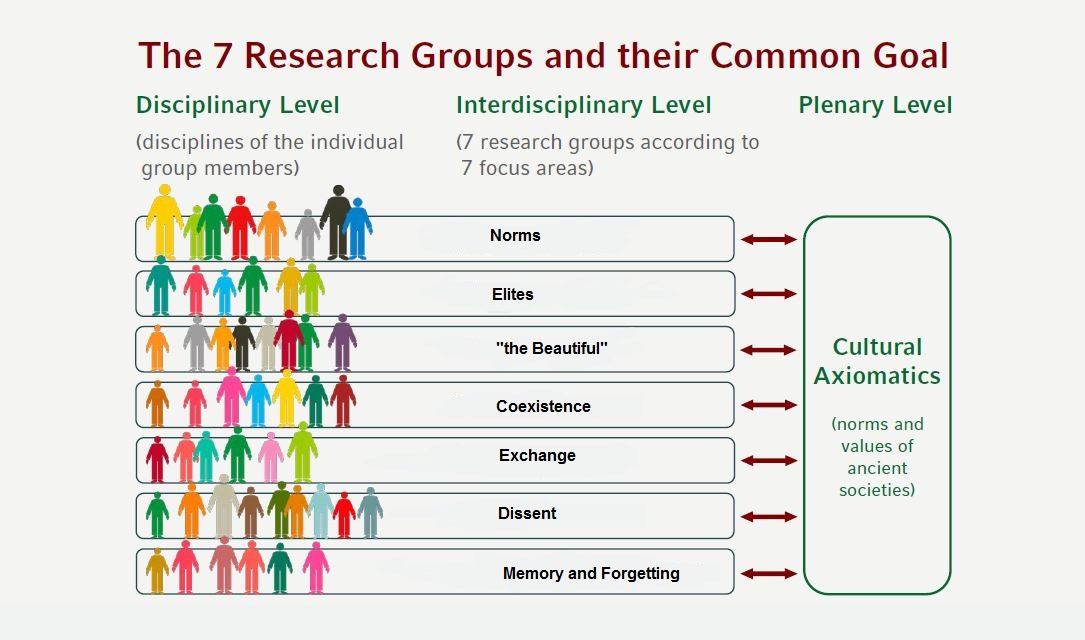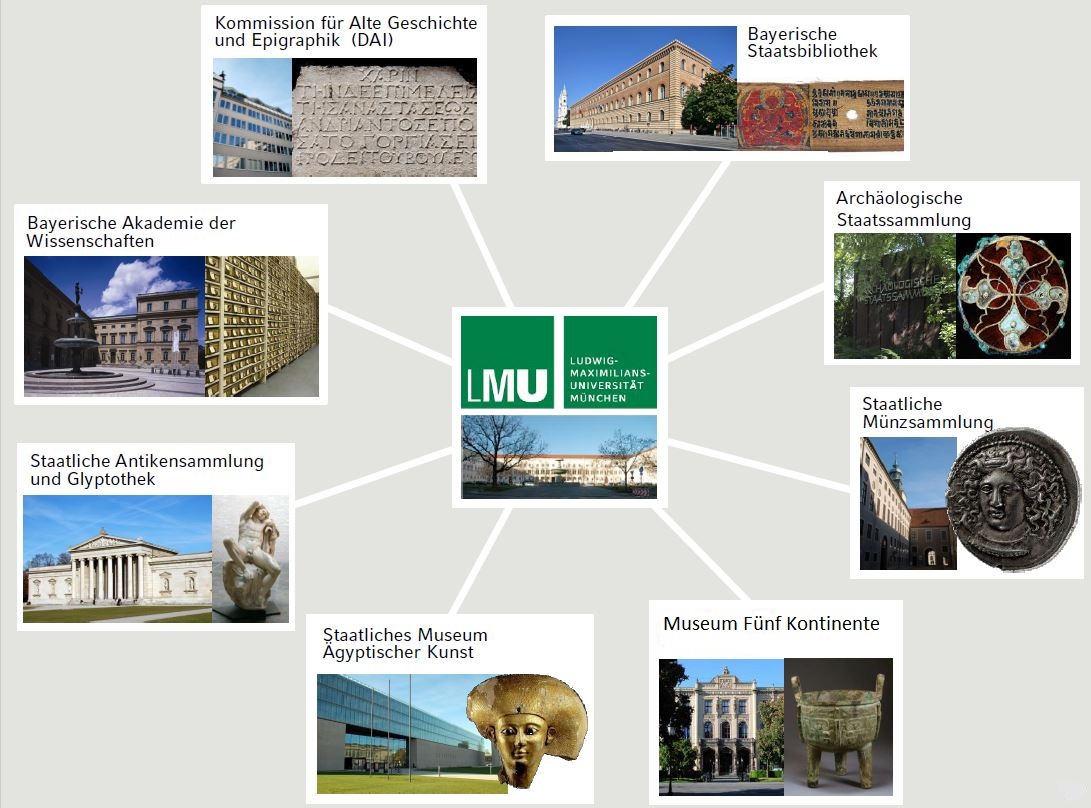Profile and aims of the Graduate School Distant Worlds
About Us
The Munich Graduate School for Ancient Studies, ‘Distant Worlds' (GSDW), was founded in 2012 under the aegis of the German Universities Excellence Initiative with the aim of supporting the research of young academics in all fields of ancient studies. As part of the Excellence Initiative, the GSDW is funded by the German Research Foundation (DFG). The School’s concept involves combining a flexible study programme with a stimulating discussion environment between predoctoral, doctoral, and postdoctoral fellows in small groups known as ‘focus areas’.
The Focus Areas 
Each of the seven focus areas concentrates on a different topic relevant for all ancient cultures and representative of the basic forms and structures of these cultures: norms, elites, cultural models, and principles of coexistence. When conceived of as a whole, these areas form the basis of all ancient cultures. These fundamental features usually remain unquestioned or even hidden in the very cultures in which they occur, however, so that one might speak of cultural axioms which have yet to be revealed and interpreted. This is the collective purpose of the focus areas.
The fellows of the GSDW come from various disciplines represented among the seven faculties of the LMU Munich and are at different stages of their research. This facilitates a lively exchange of ideas between scholars of diverse academic fields who have had diverse academic experiences. At the same time, the fellows are brought together by their shared awareness of the temporal and hermeneutic distance between their object of study and modern science. It is the primary aim of the School to understand this distance and its use.
The Study Programme
The study programme, which consists of seminars, courses lectures, etc., strives to bring together the different disciplines within ancient studies and to support the doctoral students in pursuing their research with focus and intensity. In the course of the study programme, methodological approaches from the disciplines involved are explained, applied, and further developed. This allows an intense and meaningful dialogue between disciplines and fertile ground for the development of innovative approaches and scholarly achievement among the fellows.
The fellows profit considerably from the transdisciplinary and transtheoretical programme of the GSDW. When, for example, material culture analyses are combined with theoretical approaches from philology, sociology, or anthropology, or archaeology contributions are brought into an analysis in religious studies, new connections can be formed and new perspectives opened.
Fellows
The GSDW has three different types of fellows:
Doctoral fellows: the graduate students in the GSDW occupy part-time positions (65%) for twenty-four (24) months. As this time comes to an end, they may apply for an extension of twelve (12) more months. Those who receive an extension therefore have a total of three years in which to complete their dissertations. The doctoral fellows profit from their double status as graduate students and employees in civil service: whilst their status as employees ensures reliable financial support, their status as doctoral students means that they receive intensive support from their supervisors and mentors; furthermore, they are provided with offices in which they may work, have access to necessary and useful study and teaching materials, and have at their disposal the network between the GSDW and its partners, including the Bavarian State Library and five museums. The obligatory participation in the programme of study, intended to broaden the academic horizon of the doctoral students (as discussed above), thereby forms the coping stone of this position.
Postdoctoral fellows: young career academics who have already obtained their PhD in a field of ancient studies may apply for a position as a postdoctoral fellow. Postdoctoral fellows occupy full-time positions for twenty-four (24) months and, like the doctoral students, have the possibility to apply for a third year of funding. They are responsible not only for conducting their own research project, but also for supervising one of the focus areas and are expected to be actively involved in the development of the study programme (e.g. by being a member of the programme committee, organising workshops and/or conferences, etc.). Postdoctoral fellows are supported by their mentors.
Predoctoral fellows: applicants who do not yet possess the necessary skills for writing a dissertation (e.g. language skills or methodological background) may be offered a position in the GSDW as a predoctoral fellow. Just as the doctoral and postdoctoral fellows, predoctoral fellows gain access to all available materials and partner libraries, are part of a focus area, and can work in one of the shared offices. Predoctoral fellowships are limited to one year; in this time, predoctoral fellows are expected to develop their skills and project proposal further so that they can apply for a doctoral fellowship.
Applicants to the GSDW cannot apply specifically for a predoctoral fellowship. The selection committee reserves the right to offer predoctoral fellowships to applicants whose project proposals are deemed to have strong potential and be worthy of support, but who have not yet acquired the necessary skill-sets for writing a dissertation.
Principal Investigators
The professors engaged in the GSDW are known as principal investigators. They are responsible for the fellows and support them in every possible way. In addition to acting as supervisors and mentors, they also offer courses in relevant fields of ancient studies and are actively and creatively involved in the design of the study programme.
- Greek and Latin Philology
- Byzantine Studies
- Egyptology
- Assyriology and Hethitologie
- Indology and Tibetology
- Sinology
- Ancient History
- Leopold-Wenger-Institute for Legal History
- Philosophy
- Protestant Theology
- Catholic Theology
- Prehistoric and Early Medieval Archeology and Archeology of the Roman Provinces
- Greek and Roman Art and Archeology
- Near Eastern Archeology
The Programme Committee
The programme committee is responsible for organising the study programme. The committee consists of three professors from different fields of ancient studies, a postdoctoral fellow, a doctoral fellow, and one of the GSDW academic coordinators. This structure ensures a stable study programme geared towards the fellows’ needs.
The Board
Board members oversee the organisation and policies of the School in order to secure the stability and flexibility of research. All fellows are entitled to bring applications for special funding and suggestions for fine-tuning the organisation and content of the GSDW before the board. The members of the board review all applications and suggestions carefully and communicate their decision promptly. The board thereby ensure not only that the needs of the School as a whole are met, but also that the individual fellows receive support.
Academic Administration and Staff
The academic administrators, team assistants, and student assistants work together closely to ensure that all decisions of the board and programme committee are executed quickly and smoothly. Additionally, they are responsible for matters of personnel and finance as well as for the organisation of events. In order to guarantee the goal-orientated management of the GSDW, the academic administration is divided into a strategic branch and a management/recruitment branch. The team assistants help to organise events, answer all questions of the fellows regarding terms of employment, and support the fellows, principal investigators, and administrators with all aspects of organisation and management. The extensive and competent support of the student assistants allows a more productive work environment for all involved.
Partner Institutions
The concept and structure of the GSDW is rounded off by cooperation with the following partner institutions:
- Münchner Zentrum für Editionswissenschaften (MüZE)

- Bayerische Staatsbibliothek
- Bayerische Akademie der Wissenschaften
- Staatliche Antikensammlung und Glyptothek
- Staatliches Museem Ägyptischer Kunst
- Staatliche Münzsammlung
- Museum Fünf Kontinente
- Archäologische Staatssammlung
- Kommission für Alte Geschichte und Epigraphik des Deutschen Archäologischen Instituts
The partner institutions provide access to additional research material, internships, and workshops on diverse subjects, thus allowing the fellows to gain insights into and, if desired, work experience in museums and libraries.
The progressive approach of the GSDW in promoting quality interdisciplinary scholarship, in its cooperation with external institutions, and in its administrative organisation opens up new research horizons for the fellows of the School and places an extensive network in ancient studies at their disposal. In this way, the School offers its participants ideal preparation for a successful academic career.


